The top 15 data privacy solutions in 2025
Your organization likely manages an increasing amount of personal, behavioral, and potentially sensitive data across websites, apps, internal systems, and third-party services. At the same time, more and more countries are implementing data privacy laws, giving you little room for error in data processing.
The right data privacy platform helps you reduce risks, simplify legal compliance, and improve transparency with your users. These tools help centralize privacy operations and streamline workflows, from cookie consent to data subject requests.
In this guide we compare 15 leading data privacy platforms for 2025 and categorize them based on what they offer. We’ve analyzed product features, user reviews, and pricing, so you can find the best fit for your organization, whether you’re just starting out or scaling enterprise-wide governance.
The 15 best data privacy solutions compared
| Category | Company name | Recommended for | Pricing |
|---|---|---|---|
| Consent Management Platforms | Usercentrics | Companies of all sizes | Free trial available Paid plans from EUR 7/month |
| CookieYes | Small businesses | Offers a free plan Paid plans from USD 10/month | |
| Ketch | Marketing/legal teams | Offers a free planPaid from USD 150/month | |
| DSAR Automation & Privacy Requests | Enzuzo | SMBs | Offers a free plan Paid plans from USD 9/month |
| Transcend | Companies of all sizes | Pricing available on request | |
| Data Discovery & Governance | BigID | Enterprise companies | Pricing available on request |
| Zendata | Startups and SMBs | Pricing available on request | |
| Drata | Software companies | Pricing available on request | |
| Website Scanning / Cookie Management | Complianz | WordPress websites | Paid plans from EUR 59/month |
| CookieFirst | Companies of all sizes | Offers a free plan Paid plans from EUR 9/month | |
| Privacy Information Management | RadarFirst | Organizations needing incident response | Pricing available on request |
| LogicGate Risk Cloud | Organizations needing risk management | Pricing available on request | |
| Hyperproof | Companies of all sizes | Pricing available on request | |
| Securiti | Large organizations | Pricing available on request | |
| Vanta | Companies needing audit readiness | Pricing available on request |
Consent management platforms for data privacy
A consent management platform (CMP) enables websites to collect, manage, and document user consent for personal data processing. It supports compliance with privacy regulations while making data use clearer and consent options more user-friendly.
Usercentrics
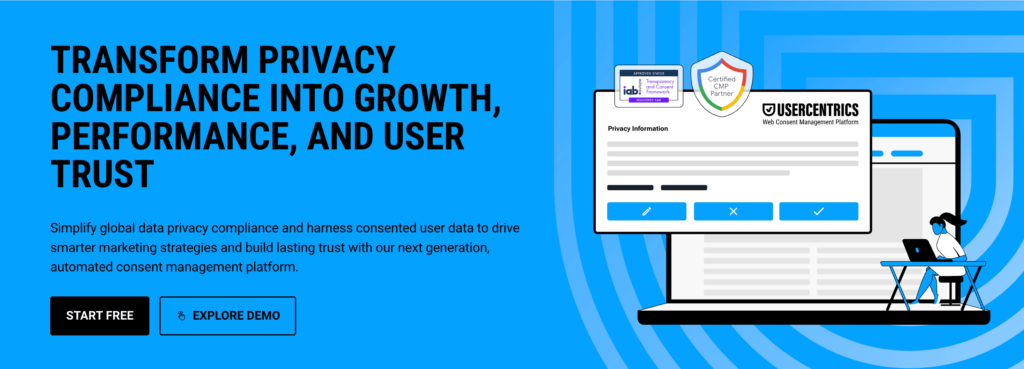
Usercentrics is a leading consent management platform (CMP) trusted by thousands of companies worldwide. Designed to simplify compliance with global privacy laws, our data privacy solution enables businesses to easily collect, manage, and document user consent across websites and apps.
It supports major regulations like the General Data Protection Regulation (GDPR),
the California Consumer Privacy Act (CCPA), and more, and integrates seamlessly with your marketing and analytics tools.
Notable features
- Automated consent collection and blocking of non-essential scripts until consent is granted, which supports privacy compliance without sacrificing user experience
- Detailed analytics and A/B testing capabilities that help optimize consent banners and improve user engagement
- Extensive customization options for banners, including branding, layout, and language, to align with your company’s visual identity
- Multi-regulation support for compliance with the GDPR, CCPA, LGPD and others on a single platform
- Real-time consent logs and history for transparency and audit purposes, which supports regulatory reporting and internal reviews
- Easy integration with existing tech stacks, including popular CMS, tag managers, and analytics platforms, to reduce deployment time and complexity
- Over 2,200 templates for data processing services to save time and resources
- Compliance scanner so you can find out which cookies and tracking technologies are collecting data on your website
Pricing
Usercentrics Web CMP offers a 14-day free trial that includes one privacy regulation on one domain. After your free trial, you can choose from five plans:
- Essential: EUR 7/month (1 privacy regulation, 1 domain, 1,500 sessions, 2 languages, and most useful features)
- Plus: EUR 15/month (multiple privacy regulations, 1 domain, 3,000+ sessions, 5 languages, and access to additional features)
- Pro: EUR 30/month (multiple privacy regulations, 3 domains, 15,000+ sessions, 60 languages, and advanced features)
- Business: EUR 50/month (multiple privacy regulations, 10 domains, 50,000+ sessions, 60 languages, extensive choice of features, full brand customization, and priority support)
- Corporate: Custom pricing (unlimited domains, multi-configuration bulk editing, A/B testing, consent banner SDK, dedicated Customer Success Executive, 24-hour support, and more)
| Pros | Cons |
|---|---|
| One unified interface to configure web and app consent management | The essential plan is limited to one domain |
| Automated blocking of non-essential services | Essential plan limited to single regulation compliance |
| Extensive analytics dashboard with A/B testing | Upgrade needed if more than 1 language is required |
| Seamless integrations with popular tools | May require technical setup for advanced use |
| 60 supported languages | |
| Highly customizable consent banners | |
| Free compliance scanner |
CookieYes
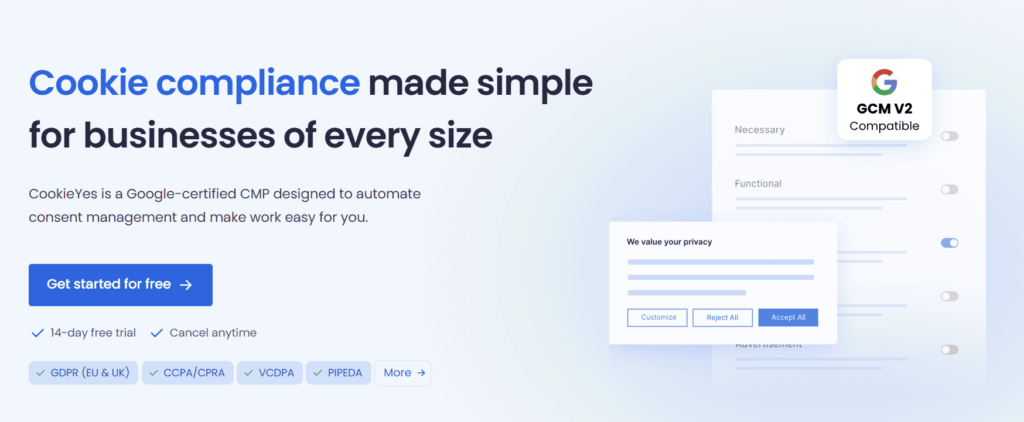
CookieYes is a widely-used cookie consent solution that helps small businesses comply with global privacy laws. The platform is especially popular among website owners looking for a quick, reliable way to manage cookies and generate privacy policies.
Notable features
- Automatically scans your website for cookies and trackers, categorizes them, and blocks non-essential cookies until users provide consent
- The customizable banner can be styled to fit your brand
- Privacy and cookie policies can be tailored to your site’s configuration
- Detailed consent logs and analytics to demonstrate legal compliance
- Integrates with WordPress, Shopify, and other CMS platforms
Pricing
- Free: 1 domain, 15,000 page views/month
- Basic: USD 10/month (unlimited cookies, more customization)
- Pro: USD 25/month (multilingual banners, geotargeting)
- Ultimate: USD 55/month (8,000 pages per scan, unlimited pageviews, custom branding)
| Pros | Cons |
|---|---|
| Quick and easy to implement | Multilingual support is only available with paid plans |
| Automatic cookie scanning and blocking | Limited customization options |
| Integrates with major CMS platforms | Advanced analytics require higher-tier plans |
| Regularly updates to enable compliance with new or changing laws |
Ketch
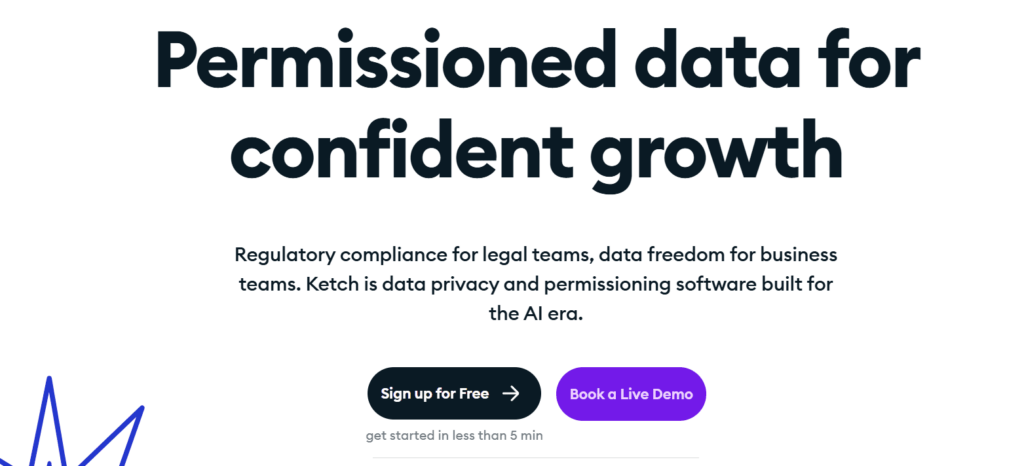
Ketch is a modern, no-code, cloud-based privacy platform designed to empower marketing teams and legal professionals to implement and manage compliance effortlessly.
Notable features
- No-code setup for consent banners, policies, and data collection workflows, enabling rapid deployment
- AI-powered consent agent that restricts data sharing and access, minimizing privacy risks
- Data mapping and inventory management to visualize and control data flows
- Pre-built integrations with popular marketing, CRM, and analytics tools
- Granular user preferences and consent management that supports privacy compliance
Pricing
- Free plan available (5,000 unique users)
- Starter: USD 150/month (30,000 unique users)
- Plus: USD 333/month (100,000 unique users)
- Enterprise: Custom pricing (unlimited monthly users)
| Pros | Cons |
|---|---|
| Offers a free plan | This is a new system and reported to have glitches |
| Automated DSAR management with higher plans | Multiple reviews mention integration issues |
| Data discovery and classification that maps to stored user consent | Most advanced features are only available on the enterprise-level plan |
Managing data subject requests efficiently
Data Subject Access Request (DSAR) automation simplifies how you respond to user requests to access, change, or delete their personal data.
Below are several data protection and management tools that make managing those requests faster, easier, and that enable compliance with privacy laws.
Enzuzo
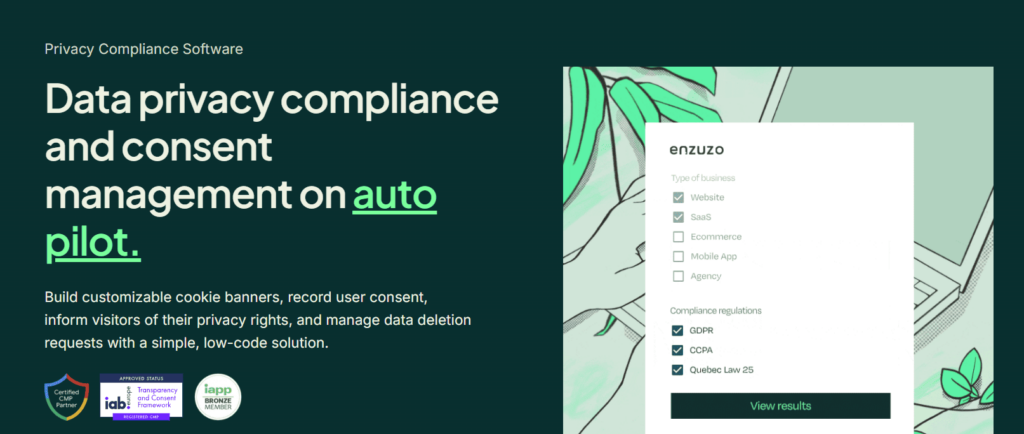
Enzuzo is a privacy management platform designed with simplicity in mind, so it’s a strong choice for small and mid-sized businesses. The platform covers the essentials of privacy compliance, from generating legally-compliant privacy policies to managing cookie consent and automating data subject requests.
Notable features
- Privacy policy and terms of service generator that adapts to your business location and sector
- Consent management tools that enable users to easily accept, decline, or modify their preferences
- DSAR automation to efficiently process data access, deletion, or correction requests
- User-friendly dashboard to provide a clear overview of compliance status
- Integrations with website builders and ecommerce platforms for straightforward setup
- Helpful templates and resources to guide businesses through privacy best practices
Pricing
- Free plan available (basic privacy policy and cookie banner)
- Starter: USD 9/month (unlimited DSARs, advanced consent management)
- Growth: USD 29/month (integrations and analytics)
- Pro: USD 79/month (weekly cookie scan, 5 users, 10 domains, up to 30,000 monthly visitors)
- Enterprise: Custom pricing for enterprise-level consent and unlimited users
| Pros | Cons |
|---|---|
| Very easy to set up and use | Limited customization options on the free plan |
| Affordable pricing tiers | Fewer advanced features compared to enterprise platforms |
| Automated DSAR handling | Not designed for complex, multi-jurisdictional needs |
| Integrates with major website builders | Some integrations require paid plans |
Transcend
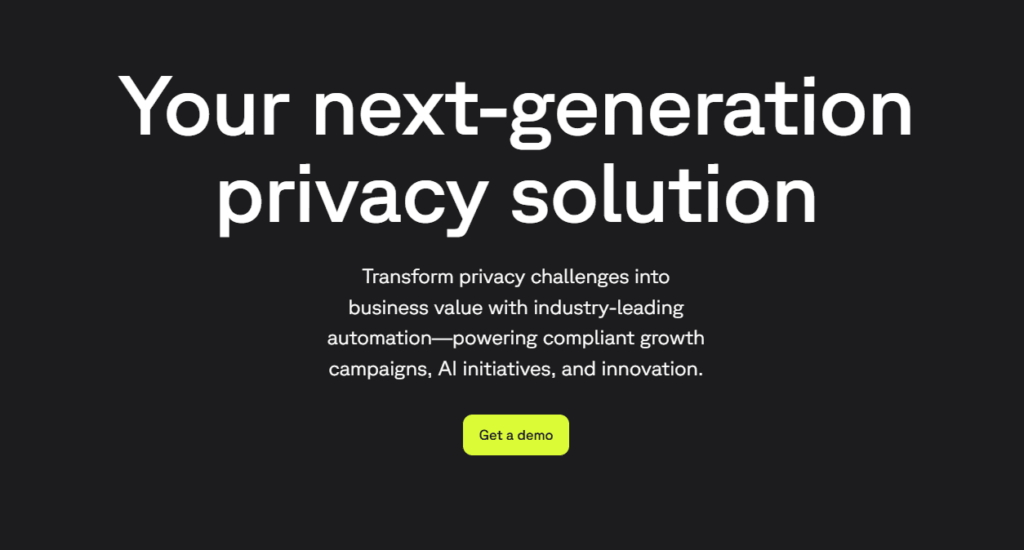
Transcend focuses on data privacy infrastructure. It offers tools for data subject requests, consent management, and data mapping. The platform is built for companies managing complex data environments to more easily automate privacy workflows at scale.
Notable features
- Streamlines DSAR fulfillment with automated data discovery, redaction, and secure delivery
- Enables granular consent collection and management across multiple touchpoints for GDPR and CCPA/CPRA compliance
- Visualizes data flows to help identify privacy risks and compliance gaps
- Manages privacy policies, vendor assessments, and risk evaluations in one place
- Integrates with popular tools and data stores to automate privacy workflows
Pricing
Pricing is available on request and typically depends on the size and complexity of the organization, as well as the specific features and level of support required.
| Pros | Cons |
|---|---|
| Comprehensive tools for managing complex data environments | Complex implementation process |
| Numerous automation options for large organizations | Reported integration issues |
| Extensive integrations with various business applications | Reviews mention that the price is high and that it may not be a good fit for smaller companies |
Tools for data discovery and governance
Data discovery and governance tools help organizations understand what personal data they have, where it’s stored, and how it’s used. This visibility supports both compliance and data protection within companies.
BigID
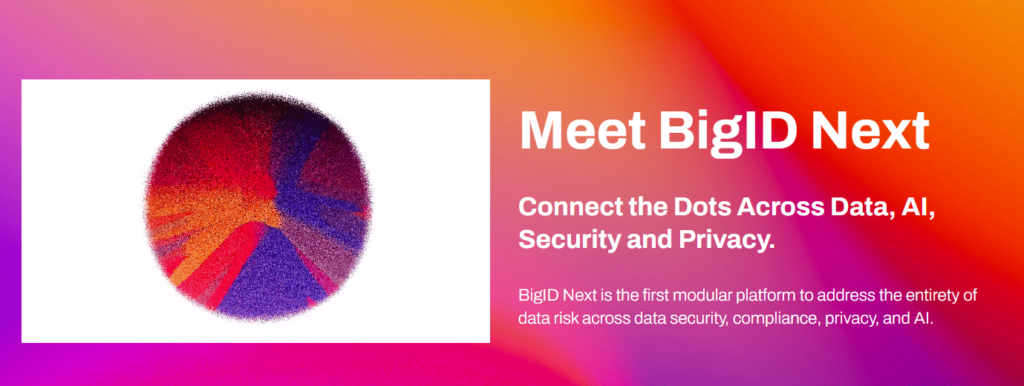
BigID is a data intelligence platform that helps organizations discover, classify, and manage personal data across their entire data landscape. It provides visibility into data assets, automates compliance tasks, and enables data-driven privacy decisions.
Notable features
- Data discovery and classification automatically identifies and categorizes personal data across structured and unstructured data sources
- Data rights automation fulfills data subject requests automatically, including access, deletion, and correction
- Data risk intelligence identifies and assesses data privacy risks based on data sensitivity, location, and usage patterns
- Data retention management helps organizations define and enforce data retention policies to minimize storage costs and reduce compliance risks
- Privacy impact assessments automate the identification and mitigation of potential privacy risks
Pricing
Pricing is available on request and typically depends on the number of data sources and the volume of data being managed.
| Pros | Cons |
|---|---|
| Automatically identifies and categorizes personal data, reducing manual effort | Requires specialized expertise for effective implementation |
| Strong automation for data rights and risk assessment | High pricing might be a barrier for smaller organizations |
| Comprehensive integration capabilities with diverse data sources |
Zendata
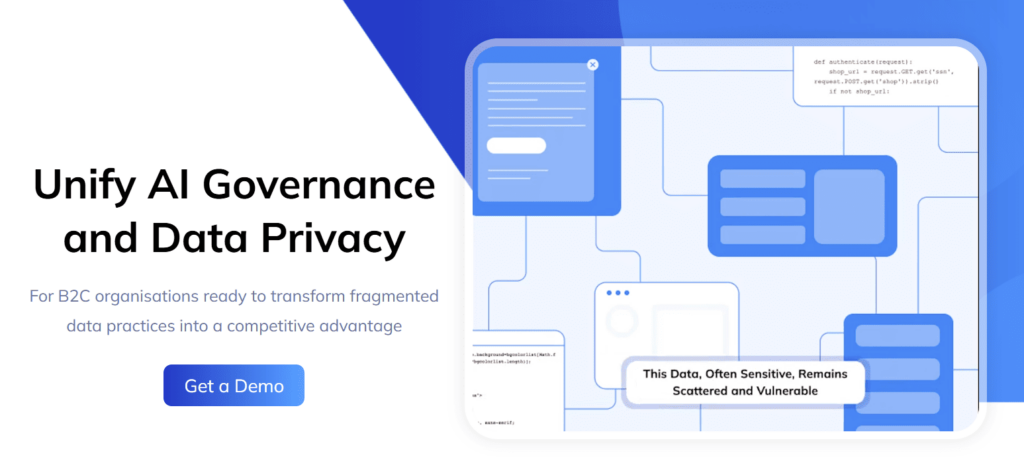
Zendata is a data privacy platform specifically designed for startups and SMBs. It offers a simplified approach to data privacy compliance, with tools for consent management, data mapping, and DSAR automation.
Notable features
- Provides quick setup and easy integration that doesn’t require technical expertise
- Uses AI to identify and classify personally identifiable information (PII) across text and code
- Automates GDPR and CCPA compliance through website and app scanning
- Offers visibility into data flows and third-party data sharing risks
- Includes cookie consent management to maintain compliance
- Connects multiple data sources to prevent silos and improve data governance
Pricing
Zendata provides no pricing information on its website. Interested parties would need to schedule a demo to learn more.
| Pros | Cons |
|---|---|
| Easy and fast implementation with no-code tools | Limited language support for non-English data |
| Effective PII detection that outperforms some competitors | Some users report missing features and limited customization options |
| Helps uncover oversharing and unsanctioned data use | |
| Provides actionable, automated compliance reports |
Drata
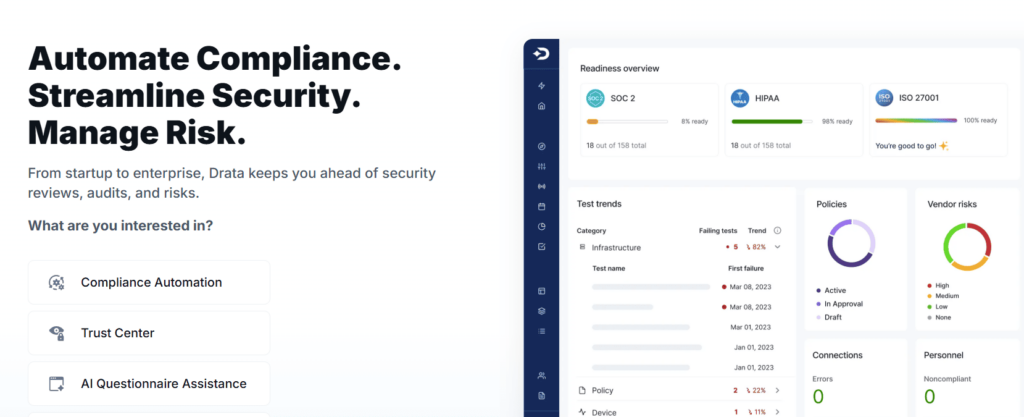
Drata is a security and compliance automation platform that continuously monitors and collects evidence of a company’s security controls. This helps streamline compliance with frameworks like System and Organization Controls 2 (SOC 2), the Health Insurance Portability and Accountability Act (HIPAA), the GDPR, ISO 27001, and Payment Card Industry Data Security Standard (PCI DSS).
Notable features
- Continuous monitoring provides real-time visibility into security posture and compliance status
- Automated evidence collection reduces manual work and audit preparation time
- A centralized dashboard manages multiple compliance frameworks in one place
- Integrates with over 55 tools including cloud providers, identity management, and version control systems
- Role-based access controls and task management streamline workflows and protect sensitive data
- Real-time reporting and alerts help teams quickly address compliance gaps
Pricing
The Drata data protection tool offers three different plans, but their website does not indicate starting prices.
| Pros | Cons |
|---|---|
| Automates complex compliance tasks and evidence collection to save significant time | Although they offer specialized integrations, reviews suggest that users would like more integration options |
| Supports a wide range of regulatory frameworks and custom controls | Some users report missing key features |
| Continuous monitoring supports ongoing compliance and audit readiness | Some advanced features are only available in higher tier plans |
Website scanning and cookie compliance solutions
Website scanning and cookie management tools support compliance by automatically scanning websites for cookies and providing tools for consent management.
Complianz

Complianz is a WordPress plugin designed to manage cookie consent and privacy compliance. It helps websites meet requirements under the GDPR, CCPA, and other privacy laws.
Notable features
- Automatically scans websites for cookies and can generate a compliant cookie policy
- Provides customizable cookie consent banners tailored to visitor location and applicable laws
- Generates additional legal documents like Privacy Statements and Processing Agreements
- Offers A/B testing and detailed statistics on cookie consent interactions
- Blocks third-party cookies and scripts until users give consent
- Compatible with WordPress multisite networks (with Agency plan)
Pricing
Complianz offers four plans:
- Free: Valid for 1 website and includes basic cookie banner and policy generation
- Personal: USD 59/year for 1 website and includes full legal documents and priority support
- Professional: USD 179/year for up to 5 websites and includes all Personal plan features and multi-site use
- Agency: USD 399/year for up to 25 websites, includes multisite support, which is ideal for agencies and developers
| Pros | Cons |
|---|---|
| Automated cookie scanning and policy generation are easy to use | Some users report needing more customization options for banners and policies |
| Supports multiple privacy regulations and visitor geotargeting | User interface can be less intuitive compared to some alternatives |
| Offers comprehensive legal document creation beyond cookie policies |
CookieFirst
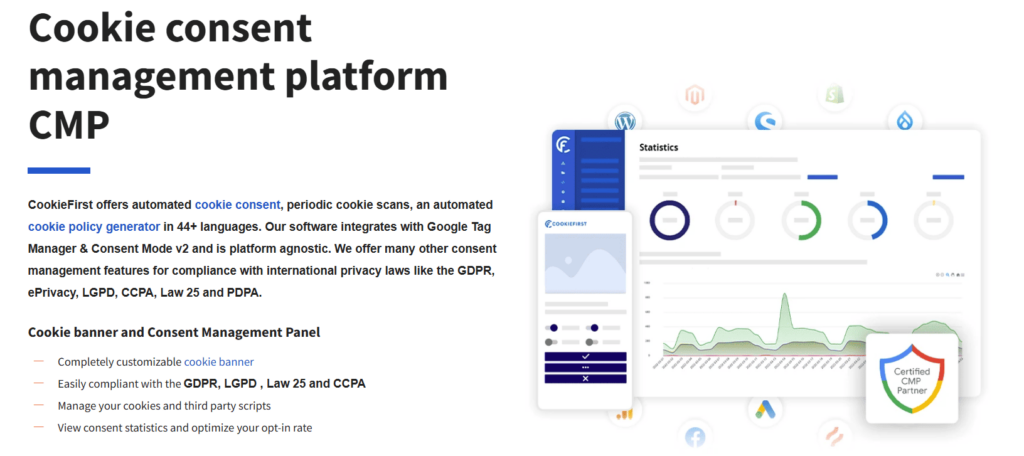
CookieFirst is a cookie consent management platform that automates compliance with the GDPR, ePrivacy Directive, CCPA, LGPD, and other privacy laws. It does so by providing cookie scanning, consent banners, policy generation, and third-party script management.
Notable features
- Automated periodic cookie scanning and cookie policy generation to keep compliance up to date
- Customizable cookie consent banners with geo-targeting and multi-language support (44+ languages)
- Consent audit trails and detailed consent statistics for transparency and reporting
- Management of third-party scripts with blocking until user consent is given
- Integration with Google Consent Mode v2 and support for the IAB TCF 2.2 for ad consent compliance
- Flexible banner customization with white-label options on paid plans
Pricing
- Free: Includes a single banner, one third-party script, one cookie scan, one language, basic setup
- Basic: EUR 99/year (or EUR 9/month)and includes all third-party scripts, monthly cookie scans, multiple languages, white-label banners, consent statistics, and support response in under 72 hours
- Plus: EUR 209/year (or EUR 19/month), offers all Basic plan features, plus faster support, opt-in rate optimization, IAB TCF 2.2 support, and is suitable for higher traffic sites
- Enterprise: Custom pricing and is tailored for large organizations, includes multi-domain management, API integrations, and advanced compliance features
| Pros | Cons |
|---|---|
| Mostly automated compliance features reduce manual work | More advanced design customizations require higher-tier plans |
| User-friendly and highly customizable cookie banners | Some user reviews report that documentation can be incomplete or outdated, requiring some learning curve |
| Supports over 44 languages and geotargeted consent management |
Privacy incident and information management platforms
Privacy and Information Management solutions help organizations handle and respond to data privacy incidents, conduct risk assessments, and maintain compliance with privacy regulations.
RadarFirst
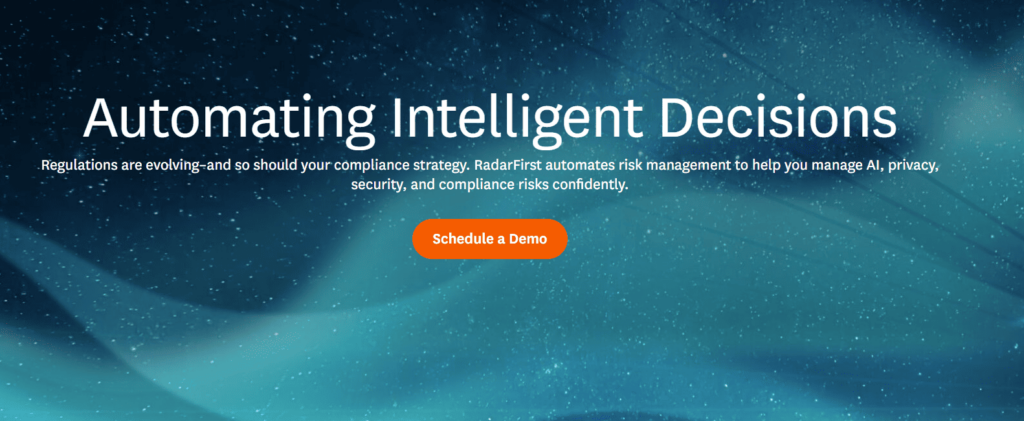
RadarFirst is a SaaS platform that automates and streamlines privacy and compliance incident management. It offers configurable rules, risk assessments, and workflow automation. These features support consistent and defensible breach notification decisions, as well as regulatory compliance.
Notable features
- Automated incident risk assessment using configurable rules to evaluate material risk and determine notification obligations
- Streamlined incident intake and management workflows that reduce investigation time and improve team collaboration
- Consistent and defensible breach notification decisions supported by audit trails for internal and external compliance proof
- Customizable workflows that assign tasks and involve stakeholders at appropriate stages of incident resolution
- Real-time incident tracking and documentation, including fraud events and regulatory reporting
- Patented automation technology that minimizes subjectivity and reduces errors in incident risk evaluation
Pricing
RadarFirst pricing is quote-based and tailored to each organization’s needs. No public pricing or free trial is available.
| Pros | Cons |
|---|---|
| Significantly reduces time and effort required for privacy incident response | No public pricing |
| Provides a repeatable, audit-compliant process that can improve regulatory compliance | Limited publicly available user reviews and feature comparisons compared to some competitors |
| Enables clear documentation and proof of compliance with detailed audit trails |
LogicGate
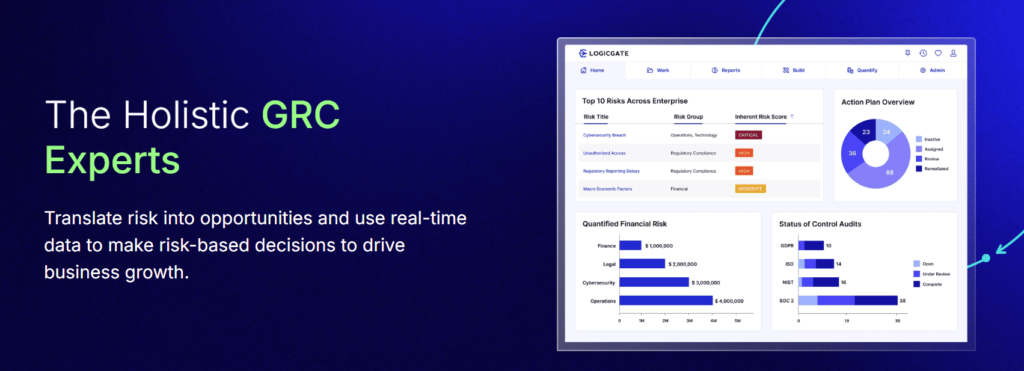
LogicGate is a no-code governance, risk, and compliance (GRC) platform. It helps organizations automate risk management, compliance tracking, and regulatory exam management through customizable workflows and centralized reporting.
Notable features
- No-code platform that enables users to build and modify risk and compliance workflows without technical expertise
- Automated evidence collection and task notifications to keep stakeholders accountable
- Real-time compliance visibility with customizable reports by jurisdiction, region, and owner
- Integrations with over 55 tools via API and connectors to sync data from security, HR, and other systems
- Supports multiple GRC use cases including cyber risk, third-party risk, enterprise risk, and regulatory compliance
- Role-based access controls, customizable dashboards, and alerts for proactive risk management
Pricing
LogicGate offers custom pricing and interested companies must contact LogicGate directly.
| Pros | Cons |
|---|---|
| User-friendly, no-code interface enables quick deployment and customization | Learning curve for building effective workflows despite no-code design |
| Comprehensive platform that covers a wide range of GRC needs in one place | Some users find that the interface requires a learning curve |
| Automated workflows and evidence collection reduce manual compliance work | No fully transparent pricing publicly available; requires direct vendor engagement |
| Responsive customer support with options for dedicated success managers |
Hyperproof

Hyperproof is a compliance operations platform designed to simplify audits and streamline both risk management and compliance program management. The platform is suitable for organizations of all sizes, but is especially well suited to mid-market to enterprise companies.
Notable features
- Automated evidence collection and audit workflows to reduce manual effort
- Centralized dashboard for tracking compliance status, risks, and team activities
- Support for multiple compliance frameworks including SOC 2, GDPR, HIPAA, PCI DSS, ISO 27001, and NIST
- Collaboration tools with task assignment and progress tracking across teams
- Real-time reporting and visibility into control effectiveness and audit readiness
- Security features such as SAML and single sign-on (SSO) support
Pricing
Hyperproof’s website does not include pricing information, so interested parties need to book a custom demo.
| Pros | Cons |
|---|---|
| Streamlines compliance workflows and audit preparation | Some reviews mention missing key features |
| Strong integration ecosystem with popular business and security tools | Progress and feature updates can be slower, which may frustrate teams that need quicker changes |
| Responsive customer support and helpful onboarding experience |
Securiti
Securiti is an AI-powered platform for data privacy, security, governance, and compliance. It helps organizations automate data discovery, classification, and risk assessment. It also streamlines privacy operations across hybrid multicloud and SaaS environments.
Notable features
- Uses advanced machine learning to discover and classify sensitive data across structured and unstructured sources
- Provides data mapping and visibility into data flows and AI models
- Integrates data security posture management and access governance for hybrid cloud environments
- Offers AI-driven risk assessment and continuous monitoring with real-time alerts
- Includes customizable workflows and controls for data privacy, security, governance, and AI risk management
- Provides a centralized platform for data and AI intelligence with hundreds of built-in connectors
Pricing
Securiti offers custom pricing based on required modules and organizational needs, so interested companies need to contact the company for more information.
| Pros | Cons |
|---|---|
| A complete all-in-one platform that unifies privacy, security, governance, and compliance | There’s a steep learning curve that requires thorough training to fully leverage features |
| Strong AI capabilities for automated data discovery, classification, and risk assessment | Some users report that navigating the platform can be overwhelming due to its depth |
| Provides actionable insights and real-time monitoring for proactive risk management |
Vanta
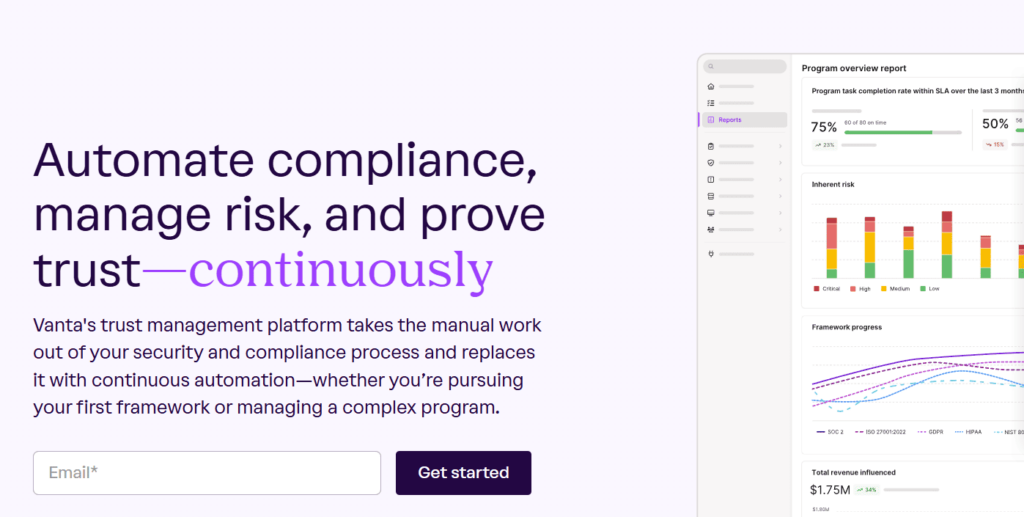
Vanta is an automated compliance platform that helps organizations monitor and manage security controls. It enables organizations to achieve and maintain certifications like SOC 2, ISO 27001, HIPAA, and more.
Notable features
- Real-time, continuous monitoring of over 1,200 automated controls with hourly tests
- Personnel management features like security training, background checks, and onboarding/offboarding workflows
- Integration with a broad ecosystem of cloud providers, identity platforms, task trackers, and vulnerability scanners
- AI-generated remediation suggestions personalized to your infrastructure
- End-to-end audit support, including communication with auditors and access to vetted audit partners
- A compliance roadmap to guide users from setup to successful audit completion
Pricing
Pricing varies based on factors like the number of users, devices, compliance requirements, and company size, so interested parties need to contact Vanta for more information.
| Pros | Cons |
|---|---|
| Significantly reduces manual compliance work through automation and continuous monitoring | Some users report the platform has a learning curve and can be initially complex |
| Supports a wide range of compliance frameworks with cross-mapping to streamline efforts | Limited public transparency on exact pricing details |
| Provides a centralized platform for policy, personnel, and audit management | |
| Extensive integration options |
How to choose the right data privacy software solution?
With so many options available, choosing the right data privacy tool depends on your specific needs, resources, and level of regulatory exposure.
Here’s what to look for:
- Regulatory coverage: Make sure the tool supports the regulations that apply to you, like the GDPR, CCPA, or HIPAA. Some platforms focus on consent management, while others cover broader needs like DSAR handling or RoPA documentation.
- Ease of use and setup: Consider how quickly your team can get started. Some tools offer no-code setups and integrations with common CMS and tag managers, while others are built for custom, developer-led implementation.
- Automation and workflows: Automation matters, especially if you get lots of privacy requests. Look for features like consent logging, DSAR automation, and audit trails to save time and reduce manual work.
- Data mapping and vendor tracking: Tools that map data flows and flag third-party risks offer better visibility and control, especially for larger businesses.
- Pricing and scalability: Free tools generally work for basic compliance. For more advanced needs, check whether pricing scales with traffic, domains, or request volumes, and what support is included at each level.
- Integration options: Choose software that integrates seamlessly with your existing tools, such as cloud providers, security platforms, and business applications.
By evaluating these factors, you can select a compliance automation solution that simplifies regulatory management and best supports your business’s long-term success.